Overview
- Brief Narrative
- Dark red tefillin storage bag used by Abraham Hartog Reiss in Amsterdam. The tefillin pouch and his other religious articles were hidden with his infant granddaughter Vera Reiss. Tefillin are small boxes containing prayers attached to leather straps and worn on the arm and the head by Orthodox Jewish males during morning prayers. Vera was born in March 1942 in German occupied Amsterdam. That summer, the Germans began mass deportations. In July, Vera’s father Salomon allowed himself to be arrested, to spare his wife Sophie and Vera from deportation. Sophie and Vera went into hiding with Sophie’s cousin Cato and then were hidden separately. Vera was taken in by Hermanus and Huberta Van Pelt in Baarn, clients of Abraham's textile business. Sophie assumed a false identity as a housekeeper. On May 5, 1945, the Netherlands was liberated and Vera was reunited with her mother. Abraham and his wife Vrouwtje were killed in Auschwitz on December 7, 1942. Vera’s father was killed in Auschwitz in February 1943. Most of Vera’s large extended family was murdered in the Holocaust.
- Date
-
use:
before 1942
- Geography
-
use:
Amsterdam (Netherlands)
use: Baarn (Netherlands)
- Credit Line
- United States Holocaust Memorial Museum Collection, Gift of Vera Waivisz-Reiss
- Contributor
-
Subject:
Vera Waisvisz-Reiss
Subject: Abraham H. Reiss
- Biography
-
Vera Reiss was born on March 5, 1942, in Amsterdam, Netherlands, the only child of a Jewish couple, Salomon and Sophie Duim Reiss. Salomon, called Sal, was born on January 24, 1902, in Amsterdam, to Abraham Hartog and Vrouwtje Duyts Reiss. Abraham was born March 2, 1875, in London, to a Dutch family. He was a well-known and prosperous merchant and owned a textile business in the center of Amsterdam. Vrouwtje was born August 17, 1876, in Amsterdam. Sal had four siblings: Hartog, called Harry (b. 1900), Jacob, called Jaap (1905-1944), Lehman (1907-1943), and Elizabeth Jeannette (b. 1909). Vera’s mother Sophie was born on August 7, 1903, in Amsterdam, to Wolf and Keetje Meijer Duim. Wolf was born August 16, 1856, in Amsterdam. Keetje was born March 15, 1858, in Groningen. Sophie had a sister and two brothers: Jansje (1885-1943), Mozes (1896-1944), and Salomon (1898-1943). Their father Wolf died on January 11, 1911. Sal and Sophie were married on December 23, 1936. Sal was a literary editor and devoted much of his time to charitable organizations. Sophie’s mother Keetje died on December 1, 1937.
On May 10, 1940, Germany invaded the Netherlands. In 1941, Jews were required to register with the authorities. Large scale deportations to camps in the east began in summer 1942. In July, Vera’s father Sal allowed himself to be arrested, so Sophie and Vera would not be taken. He was sent to Westerbork transit camp. Sophie received a letter from her brother Salomon, who was also imprisoned in Westerbork. Salomon, his wife Rose Velleman (b.1904), and their daughter Kitty Jeanette (b. 1935) had gone into hiding, but they were betrayed and arrested. He wrote that Sophie should resist being arrested because of the terrible conditions, and that he was fearful of what awaited them. Soon after, German soldiers attempted to arrest Sophie, but she convinced them that she could not walk and that Vera was in poor health, so they let her go. Sophie decided to flee before they could be deported. For a short time, Vera and Sophie hid with Sophie’s cousin, Cato Duim, who married a non-Jew. In late 1942, Sophie and Vera were hidden separately. Vera, 9 months old, was placed in hiding in Baarn in Utrecht province with a Dutch couple, Hermanus Gerrit and Huberta Johanna van Wyngaarden Van Pelt. They were clients of Vera’s paternal grandfather Abraham. They also hid Abraham’s religious articles. Vera’s false name was Vrouwke Peters, but the Van Pelts called her Meiske, the Dutch word for girly. They said she was their niece who had survived the bombings. They lived near a large botanical garden where they would hide Vera if it seemed dangerous at home. They had a ladder which they hid nearby for this purpose. On May 5, 1945, the Netherlands was liberated. The war ended when Germany surrendered on May 7.
Soon after liberation, Vera was reunited with her mother Sophie. Vera suffered from malnutrition and was hospitalized for a while. Sophie moved constantly while in hiding, living under a false identity as a seamstress and housekeeper. Vera and Sophie returned to Amsterdam. Vera’s father Sal had been deported on December 8, 1942, to Auschwitz and died on February 28, 1943, in Auschwitz-Monowitz. Almost all of Vera’s extended family was killed in Auschwitz: her paternal grandparents Abraham and Vrouwtje on December 7, 1942; her paternal uncle Lehman on January 9, 1943; her maternal aunt Jansje on February 26, 1943; her paternal uncle Jaap on October 12, 1944; her maternal uncle Mozes on March 31, 1944; and Mozes’ wife Rebecca Troeder (b. 1896) and their children Sara (b. 1923) and Wolf (b. 1928) on October 22, 1943. Vera’s maternal uncle Salomon, his wife Rose, and their daughter Kitty were killed in Sobibor on July 16, 1943. Vera’s maternal cousin Benjamin de Vries survived the war. He was active in the Dutch resistance and was the editor of the underground newspaper Het Parool. Vera’s paternal uncle Harry and paternal aunt Elizabeth also survived. The family had left many valuable belongings, such as jewels and stamp collections, with friends before deportation or going into hiding, but few items were returned after the war.
Vera’s mother Sophie, 61, passed away on July 25, 1965. Vera married Herman Eduard Waisvisz, who was born on November 2, 1934, in Pangkalpinang, Dutch East Indies (now Indonesia), to Max and Eva Dejong Waisvisz. Herman’s family had fled the Netherlands to the Dutch East Indies before the outbreak of war. Vera and Herman eventually immigrated to Canada, then the United States. They had a son, David (1967-2004). Vera remained in touch with the Van Pelts until their deaths, Hermanus circa 1960 and Huberta on December 10, 1970. Vera's husband Herman, 65, died on May 9, 2000.
Abraham Hartog Reiss was born on March 2, 1875, in London, England, to a Jewish couple, Hartog Abraham and Elizabeth Veerman Reiss. His father Hartog was born on September 4, 1849, in Amsterdam, Netherlands. His mother Elizabeth was born on January 20, 1851, in Amsterdam. Hartog and Elizabeth married on June 17, 1874, in Amsterdam, then moved to London. Abraham had seven younger siblings: Mary, born on March 17, 1878, Jacob, born on February 14, 1880, Simon, born on September 24, 1882, Clara, born on December 26, 1884, Isaac, born on August 22, 1886, Barend, born on February 18, 1889, and Maurits, born on May 19, 1891. The family returned to Amsterdam in approximately 1879. On June 15, 1899, Abraham married Vrouwtje Duijts, who was born on August 17, 1876, in Amsterdam. The couple had five children: Hartog, called Harry, born on April 1, 1900, Salomon, called Sal, born on January 24, 1902, Jacob, called Jaap, born on July 24, 1905, Lehman, born on June 8, 1907, and Elizabeth Jeannette, born on June 21, 1909. Abraham was a properous and well known merchant and owned a textile store in Amsterdam and as well as a network of sales stalls at markets throughout Holland.
On May 10, 1940, Germany invaded the Netherlands. In 1941, Jews were required to register with the authorities. Deportations began in summer 1942. Abraham and his wife Vrouwtje were deported to Auschwitz concentration camp in Poland, and killed on December 7, 1942. Almost all of Abraham’s family was killed in Auschwitz: his sister Clara and her husband Juda Aarons on September 10, 1942; his brother Maurits on October 22, 1942; his son Lehman on January 9, 1943; his son Sal on February 28, 1943, in Auschwitz-Monowitz; his brother Jacob and his wife Grietje on November 19, 1943; and his son Jaap on October 12, 1944. Abraham’s brother Isaac and his wife Rebecca were murdered on June 4, 1943, in Sobibor killing center. Abraham’s daughter Elizabeth, son Harry, brother Barend, and sister Mary survived the Holocaust. His granddaughter Vera survived in hiding with Hermanus and Huberta Van Pelt, who had been clients of Abraham. Abraham’s brother Simon’s fate is unknown.
Physical Details
- Classification
-
Jewish Art and Symbolism
- Category
-
Jewish ceremonial objects
- Object Type
-
Tefillin bags (lcsh)
- Physical Description
- Small, worn, dark red velvet, square pouch with 2 drawstrings, 1 red cord and 1 light blue, inserted through a channel in the lining near the top. The red drawstring passes through 2 reinforced holes to form an exterior pull loop. There is a slit at the top of one side seam. It is lined with textured brown cloth. The light blue drawstring is loose and frayed.
- Dimensions
- overall: Height: 7.000 inches (17.78 cm) | Width: 6.750 inches (17.145 cm)
- Materials
- overall : velvet, cloth, cord, thread
Rights & Restrictions
- Conditions on Access
- No restrictions on access
- Conditions on Use
- No restrictions on use
Keywords & Subjects
- Topical Term
- Hidden children (Holocaust)--Netherlands--Biography. Holocaust, Jewish (1939-1945)--Netherlands--Personal narratives. Jewish children in the Holocaust--Netherlands--Biography. Jewish families--Netherlands--Amsterdam--Biography. Jews--Persecution--Netherlands--Biography. Righteous Gentiles in the Holocaust--Netherlands--Biography. World War, 1939-1945--Jews--Rescue--Netherlands--Personal narratives.
Administrative Notes
- Legal Status
- Permanent Collection
- Provenance
- The tefillin pouch was donated to the United States Holocaust Memorial Museum in 2002 by Vera Waisvisz-Reiss.
- Funding Note
- The cataloging of this artifact has been supported by a grant from the Conference on Jewish Material Claims Against Germany.
- Record last modified:
- 2022-10-03 10:57:00
- This page:
- https://collections.ushmm.org/search/catalog/irn510995
Download & Licensing
In-Person Research
- By Appointment
- Request 21 Days in Advance of Visit
- Plan a Research Visit
- Request to See This Object
Contact Us
Also in Vera Waisvisz-Reiss family collection
The collection consists of baby clothes, bags, a mezuzah, a pin, a purse, a tallit, a tallit katan, tefillin, correspondence, and photographs relating to the experiences of Vera Reiss, a hidden child, and her family before, during, and after the Holocaust in the Netherlands.
Date: 1924-1947
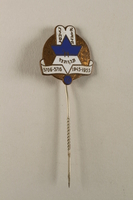
Commemorative Star of David stickpin owned by a Dutch Jewish survivor
Object
Commemorative blue and white Star of David stickpin owned by Vera Reiss, who as an infant was placed in hiding in Baarn, Netherlands, from late 1942 to May 1945. Vera was born in German occupied Amsterdam in March 1942. That summer, the German authorities began mass deportations to camps in the east. In July, Vera’s father Salomon allowed himself to be arrested, to spare his wife Sophie and their infant daughter. Sophie and Vera went into hiding with Sophie’s cousin Cato and then were hidden separately in late 1942. Vera, now 9 months old, was sent to Baarn to live with Hermanus and Huberta Van Pelt, who knew Vera’s paternal grandfather Abraham. She was given a false identity as Vrouwke Peter, their niece who had survived the bombings. On May 5, 1945, the Netherlands was liberated. Vera was reunited with her mother, who survived in hiding with a false identity as a seamstress and housekeeper. Vera’s father was killed in Auschwitz in February 1943. Most of Vera’s large extended family was murdered in the Holocaust.
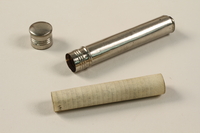
Tubular silver mezuzah saved with a hidden Dutch Jewish infant
Object
Silver mezuzah used by Abraham Hartog Reiss in Amsterdam. The mezuzah and his other religious articles were hidden with his infant granddaughter Vera Reiss. According to the Torah, every doorpost in a Jewish home should display a mezuzah, a parchment scroll with two chapters from Deuteronomy, including the Shema, a central prayer of Judaism. The scroll is put in a case to fasten it to the right doorpost. It serves as a reminder of the covenant of faith and a notice of an observant Jewish home. Vera was born in March 1942 in German occupied Amsterdam. That summer, the Germans began mass deportations. In July, Vera’s father Salomon allowed himself to be arrested, to spare his wife Sophie and Vera from deportation. Sophie and Vera went into hiding with Sophie’s cousin Cato and then were hidden separately. Vera was taken in by Hermanus and Huberta Van Pelt in Baarn, clients of Abraham's textile business. Sophie assumed a false identity as a housekeeper. On May 5, 1945, the Netherlands was liberated and Vera was reunited with her mother. Abraham and his wife Vrouwtje were killed in Auschwitz on December 7, 1942. Vera’s father was killed in Auschwitz in February 1943. Most of Vera’s large extended family was murdered in the Holocaust.
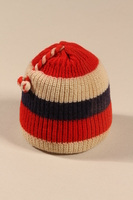
Child’s striped knit wool cap with a tassel made for a hidden Dutch Jewish child
Object
Red, white, and blue striped knit cap made for Vera Reiss by her foster mother, Huberta Van Pelt, in Baarn, Netherlands, in spring 1945. Huberta made the hat in the colors of the Netherlands flag to celebrate their liberation in May 1945. Vera was born in German occupied Amsterdam in March 1942. That summer, the Germans began mass deportations to camps in the east. In July, Vera’s father Salomon allowed himself to be arrested, to spare his wife Sophie and their infant daughter. Sophie and Vera went into hiding with Sophie’s cousin Cato and then were hidden separately. Vera, now 9 months old, was sent to live with the Van Pelts, who knew Vera’s paternal grandfather Abraham. Her mother assumed a false identity as a housekeeper. On May 5, 1945, the Netherlands was liberated. Vera was reunited with her mother. Vera’s father was killed in Auschwitz in February 1943. Most of Vera’s large extended family was murdered in the Holocaust.
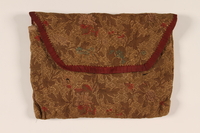
Floral silk brocade tallit pouch saved with a hidden Dutch Jewish infant
Object
Silk brocade tallit katan storage bag used by Abraham Hartog Reiss of Amsterdam. This tallit pouch and other religious articles were hidden with his infant granddaughter Vera Reiss. Vera was born in March 1942 in German occupied Amsterdam. That summer, the Germans began mass deportations. In July, Vera’s father Salomon allowed himself to be arrested, to spare his wife Sophie and Vera from deportation. Sophie and Vera went into hiding with Sophie’s cousin Cato and then were hidden separately. Vera was taken in by Hermanus and Huberta Van Pelt in Baarn, clients of Abraham's textile business. Sophie assumed a false identity as a housekeeper. On May 5, 1945, the Netherlands was liberated and Vera was reunited with her mother. Abraham and his wife Vrouwtje were killed in Auschwitz on December 7, 1942. Vera’s father was killed in Auschwitz in February 1943. Most of Vera’s large extended family was murdered in the Holocaust.
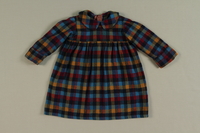
Colorful plaid dress worn by a hidden Dutch Jewish infant
Object
Plaid dress worn by Vera Reiss while living in hiding in the Netherlands from late 1942 to May 1945. Vera was born in German occupied Amsterdam in March 1942. That summer, the Germans began mass deportations to camps in the east. In July, Vera’s father Salomon allowed himself to be arrested, to spare his wife Sophie and their infant daughter. Sophie and Vera went into hiding with Sophie’s cousin Cato and then were hidden separately. Vera, now 9 months old, was sent to Baarn to live with Hermanus and Huberta Van Pelt, clients of Vera’s paternal grandfather Abraham. Her mother assumed a false identity as a housekeeper. On May 5, 1945, the Netherlands was liberated. Vera was reunited with her mother. Vera’s father was killed in Auschwitz in February 1943. Most of Vera’s large extended family were murdered in the Holocaust.
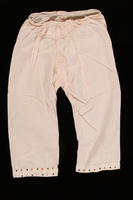
Light pink pajama set worn by a hidden Dutch Jewish infant
Object
Pink pajama top and pants worn by Vera Reiss while living in hiding in the Netherlands from late 1942 to May 1945. Vera was born in German occupied Amsterdam in March 1942. That summer, the Germans began mass deportations to camps in the east. In July, Vera’s father Salomon allowed himself to be arrested, to spare his wife Sophie and their infant daughter. Sophie and Vera went into hiding with Sophie’s cousin Cato and then were hidden separately. Vera, now 9 months old, was sent to Baarn to live with Hermanus and Huberta Van Pelt, clients of Vera’s paternal grandfather Abraham. Her mother assumed a false identity as a housekeeper. On May 5, 1945, the Netherlands was liberated. Vera was reunited with her mother. Vera’s father was killed in Auschwitz in February 1943. Most of Vera’s large extended family were murdered in the Holocaust.
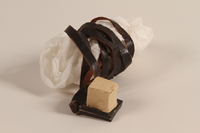
Pair of tefillin with batim covers saved with a hidden Dutch Jewish infant
Object
Pair of tefillin with batim covers used by Abraham Hartog Reiss in Amsterdam. The tefillin and his other religious articles were hidden with his infant granddaughter Vera Reiss. Tefillin are small boxes containing prayers attached to leather straps and worn on the arm and the head by Orthodox Jewish males during morning prayers. Vera was born in March 1942 in German occupied Amsterdam. That summer, the Germans began mass deportations. In July, Vera’s father Salomon allowed himself to be arrested, to spare his wife Sophie and Vera from deportation. Sophie and Vera went into hiding with Sophie’s cousin Cato and then were hidden separately. Vera was taken in by Hermanus and Huberta Van Pelt in Baarn, clients of Abraham's textile business. Sophie assumed a false identity as a housekeeper. On May 5, 1945, the Netherlands was liberated and Vera was reunited with her mother. Abraham and his wife Vrouwtje were killed in Auschwitz on December 7, 1942. Vera’s father was killed in Auschwitz in February 1943. Most of Vera’s large extended family was murdered in the Holocaust.
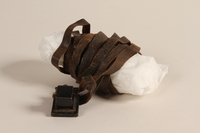
Pair of tefillin saved with a hidden Dutch Jewish infant
Object
Pair of tefillin used by Abraham Hartog Reiss in Amsterdam. The tefillin and his other religious articles were hidden with his infant granddaughter Vera Reiss. Tefillin are small boxes containing prayers attached to leather straps and worn on the arm and the head by Orthodox Jewish males during morning prayers. Vera was born in March 1942 in German occupied Amsterdam. That summer, the Germans began mass deportations. In July, Vera’s father Salomon allowed himself to be arrested, to spare his wife Sophie and Vera from deportation. Sophie and Vera went into hiding with Sophie’s cousin Cato and then were hidden separately. Vera was taken in by Hermanus and Huberta Van Pelt in Baarn, clients of Abraham's textile business. Sophie assumed a false identity as a housekeeper. On May 5, 1945, the Netherlands was liberated and Vera was reunited with her mother. Abraham and his wife Vrouwtje were killed in Auschwitz on December 7, 1942. Vera’s father was killed in Auschwitz in February 1943. Most of Vera’s large extended family was murdered in the Holocaust.
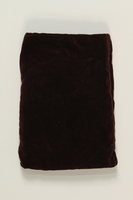
Burgundy velvet tefillin pouch saved with a hidden Dutch Jewish infant
Object
Dark burgundy tefillin storage pouch used by Abraham Hartog Reiss in Amsterdam. The tefillin pouch and his other religious articles were hidden with his infant granddaughter Vera Reiss. Tefillin are small boxes containing prayers attached to leather straps and worn on the arm and the head by Orthodox Jewish males during morning prayers. Vera was born in March 1942 in German occupied Amsterdam. That summer, the Germans began mass deportations. In July, Vera’s father Salomon allowed himself to be arrested, to spare his wife Sophie and Vera from deportation. Sophie and Vera went into hiding with Sophie’s cousin Cato and then were hidden separately. Vera was taken in by Hermanus and Huberta Van Pelt in Baarn, clients of Abraham's textile business. Sophie assumed a false identity as a housekeeper. On May 5, 1945, the Netherlands was liberated and Vera was reunited with her mother. Abraham and his wife Vrouwtje were killed in Auschwitz on December 7, 1942. Vera’s father was killed in Auschwitz in February 1943. Most of Vera’s large extended family was murdered in the Holocaust.
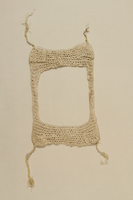
Crocheted tallit katan saved with a hidden Dutch Jewish infant
Object
Crocheted offwhite wool tallit katan worn by Abraham Hartog Reiss in Amsterdam. The tallit and his other religious articles were hidden with his infant granddaughter Vera Reiss. A tallit katan is a religious garment worn by Jewish men with their daily dress. Vera was born in March 1942 in German occupied Amsterdam. That summer, the Germans began mass deportations. In July, Vera’s father Salomon allowed himself to be arrested, to spare his wife Sophie and Vera from deportation. Sophie and Vera went into hiding with Sophie’s cousin Cato and then were hidden separately. Vera was taken in by Hermanus and Huberta Van Pelt in Baarn, clients of Abraham's textile business. Sophie assumed a false identity as a housekeeper. On May 5, 1945, the Netherlands was liberated and Vera was reunited with her mother. Abraham and his wife Vrouwtje were killed in Auschwitz on December 7, 1942. Vera’s father was killed in Auschwitz in February 1943. Most of Vera’s large extended family was murdered in the Holocaust.
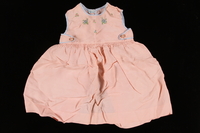
Light pink sleeveless dress worn by a hidden Dutch Jewish infant
Object
Embroidered pink holiday dress worn by Vera Reiss while living in hiding in the Netherlands from late 1942 to May 1945. Vera was born in German occupied Amsterdam in March 1942. That summer, the Germans began mass deportations to camps in the east. In July, Vera’s father Salomon allowed himself to be arrested, to spare his wife Sophie and their infant daughter. Sophie and Vera went into hiding with Sophie’s cousin Cato and then were hidden separately. Vera, now 9 months old, was sent to Baarn to live with Hermanus and Huberta Van Pelt, clients of Vera’s paternal grandfather Abraham. Her mother assumed a false identity as a housekeeper. On May 5, 1945, the Netherlands was liberated. Vera was reunited with her mother. Vera’s father was killed in Auschwitz in February 1943. Most of Vera’s large extended family were murdered in the Holocaust.
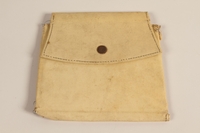
Ivory colored leather purse saved with a hidden Dutch Jewish infant
Object
Offwhite leather handbag saved with Vera Reiss, who as an infant was placed in hiding the Netherlands, from late 1942 to May 1945. Vera was born in German occupied Amsterdam in March 1942. That summer, the Germans began mass deportations to camps in the east. In July, Vera’s father Salomon allowed himself to be arrested, to spare his wife Sophie and their infant daughter. Sophie and Vera went into hiding with Sophie’s cousin Cato and then were hidden separately. Vera, now 9 months old, was sent to Baarn to live with Hermanus and Huberta Van Pelt, clients of Vera’s paternal grandfather Abraham. Her mother assumed a false identity as a housekeeper. On May 5, 1945, the Netherlands was liberated. Vera was reunited with her mother. Vera’s father was killed in Auschwitz in February 1943. Most of Vera’s large extended family were murdered in the Holocaust.
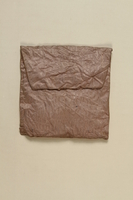
Purple striped cloth bag saved with hidden Dutch Jewish infant
Object
Light purple striped tallit storage pouch used by Abraham Hartog Reiss in Amsterdam. The tallit bag and his other religious articles were hidden with his infant granddaughter Vera Reiss. Vera was born in March 1942 in German occupied Amsterdam. That summer, the Germans began mass deportations. In July, Vera’s father Salomon allowed himself to be arrested, to spare his wife Sophie and Vera from deportation. Sophie and Vera went into hiding with Sophie’s cousin Cato and then were hidden separately. Vera was taken in by Hermanus and Huberta Van Pelt in Baarn, clients of Abraham's textile business. Sophie assumed a false identity as a housekeeper. On May 5, 1945, the Netherlands was liberated and Vera was reunited with her mother. Abraham and his wife Vrouwtje were killed in Auschwitz on December 7, 1942. Vera’s father was killed in Auschwitz in February 1943. Most of Vera’s large extended family was murdered in the Holocaust.
Reiss family papers
Document
The papers consist of letters, documents, postcards, and a newspaper clipping relating to the experiences of the Reiss family during the Holocaust in the Netherlands.
Vera Waisvisz-Reiss papers
Document
Consists of correspondence and photographs relating to the Reiss and Duim families' experiences during and after the Holocaust in the Netherlands, especially Vera Reiss's experience as a hidden child with the Von Pelt family in Baarn, Netherlands. The papers include 39 photographs depicting Vera, her relatives, and her foster family, the Von Pelts, before, during, and after the Holocaust as well as eight letters and four postcards sent to Vera's parents.
Baby blanket with an embroidered duck used by a hidden Dutch Jewish infant
Object
Embroidered baby blanket used by Vera Reiss who as an infant was placed in hiding from late 1942 to May 1945. Vera was born in German occupied Amsterdam in March 1942. That summer, the Germans began mass deportations to camps in the east. In July, Vera’s father Salomon allowed himself to be arrested, to spare his wife Sophie and their infant daughter. Sophie and Vera went into hiding with Sophie’s cousin Cato and then were hidden separately in late 1942. Vera, now 9 months old, was sent to Baarn to live with Hermanus and Huberta Van Pelt, who knew Vera’s paternal grandfather Abraham. She was given a false identity as Vrouwke Peter, their niece who had survived the bombings. On May 5, 1945, the Netherlands was liberated. Vera was reunited with her mother, who survived in hiding with a false identity as a seamstress and housekeeper. Vera’s father was killed in Auschwitz in February 1943. Most of Vera’s large extended family was murdered in the Holocaust.
White and black striped tallit saved with a hidden Dutch Jewish infant
Object
White and black striped tallit, or prayer shawl, worn by Abraham Hartog Reiss in Amsterdam. The tallit and his other religious articles were hidden with his infant granddaughter Vera Reiss. Vera was born in March 1942 in German occupied Amsterdam. That summer, the Germans began mass deportations. In July, Vera’s father Salomon allowed himself to be arrested, to spare his wife Sophie and Vera from deportation. Sophie and Vera went into hiding with Sophie’s cousin Cato and then were hidden separately. Vera was taken in by Hermanus and Huberta Van Pelt in Baarn, clients of Abraham's textile business. Sophie assumed a false identity as a housekeeper. On May 5, 1945, the Netherlands was liberated and Vera was reunited with her mother. Abraham and his wife Vrouwtje were killed in Auschwitz on December 7, 1942. Vera’s father was killed in Auschwitz in February 1943. Most of Vera’s large extended family was murdered in the Holocaust.
Vera Waisvisz-Reiss papers
Document
Consists of certificates issued to Vera Waisvisz-Reiss and correspondence regarding the retrieval of possessions placed with others for safekeeping in the Netherlands.
Reiss-Duim family collection
Document
The collection consists of a photograph taken in Scheveningen, Netherlands, of Roosje and Kitty Duim [donor's maternal uncle's wife and daughter] who perished in Sobibor, two postwar documents stating that Sophie Reiss-Duim [donor's mother] inherited Roosje and Kitty's estate, and one prewar handwritten note stating that the Reiss family valubles were entrusted to non-Jewish family before their deportation.




